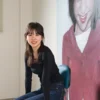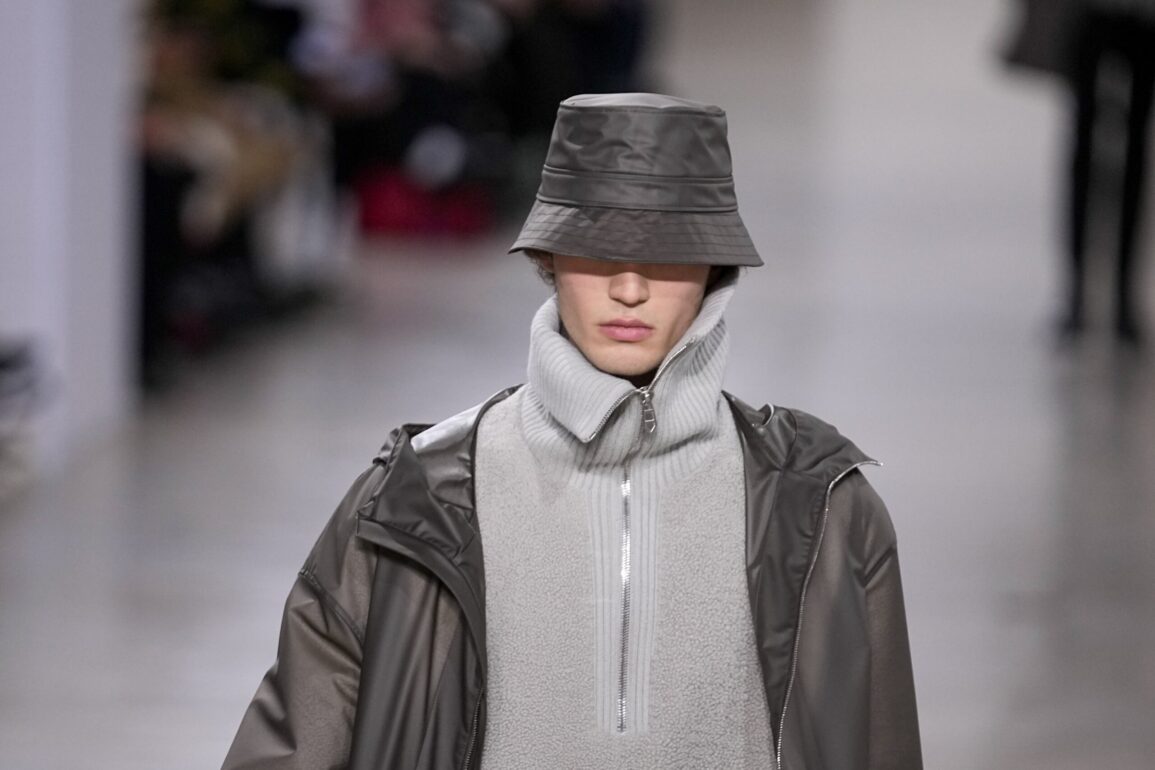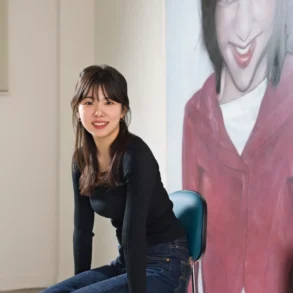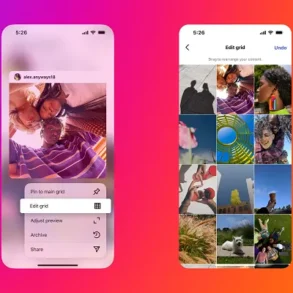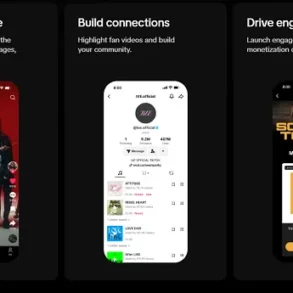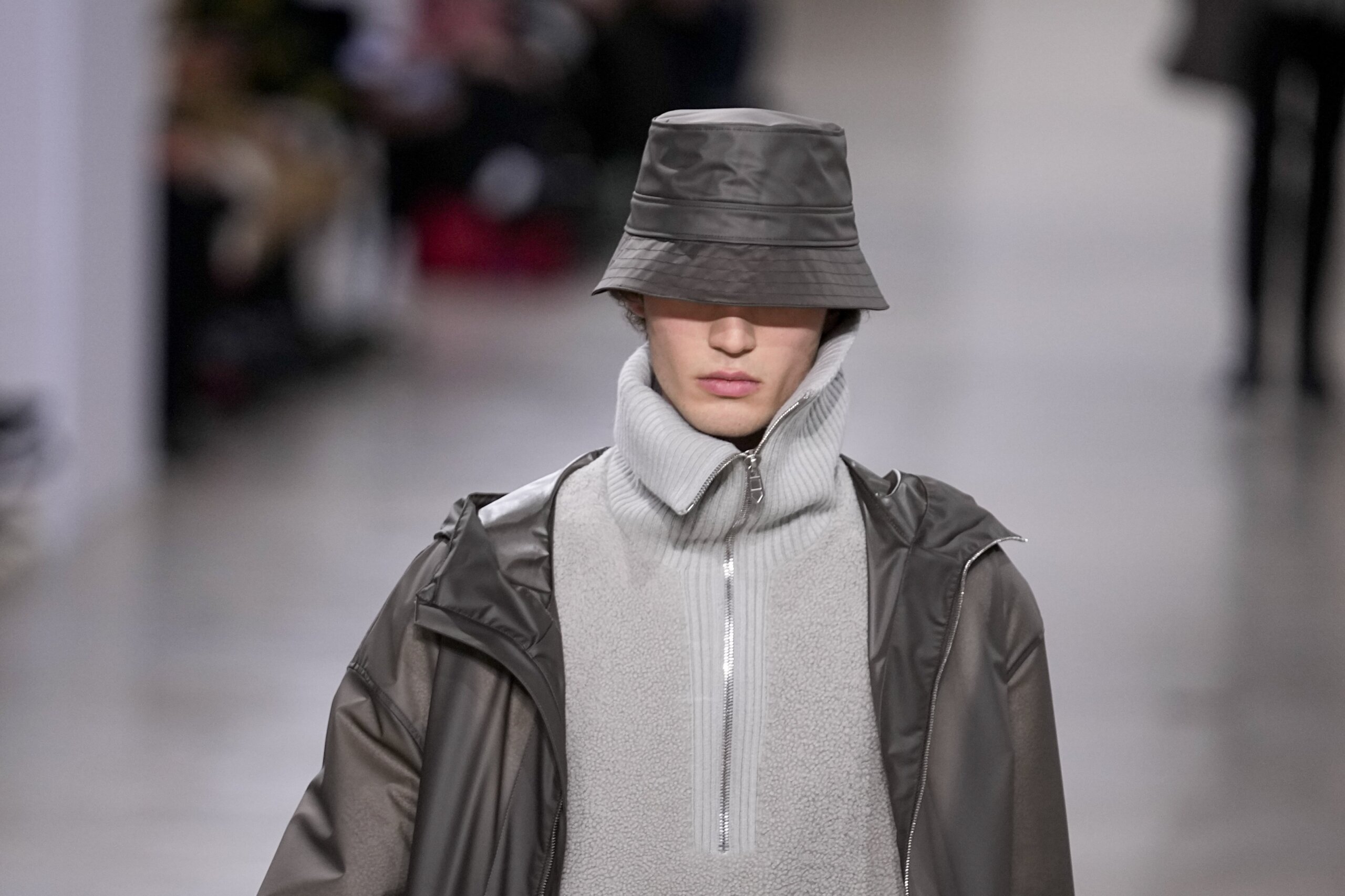
PARIS (AP) — In a dazzling universe where high-art, fashion and celebrity collide, Jonathan Anderson’s latest collection for Loewe explored modern masculinity, set against the backdrop of our social media-saturated world. The show space, transformed by artist Richard Hawkins’ vibrant pop art, was a visual assault on the senses, setting the stage for a collection as rich in narrative as in aesthetic. Amidst the audience, actor Jamie Dornan was spotted, amusedly gazing at fleeting images of himself woven into pulp fiction video collages that spanned from paparazzi shots to art history and social media.
LOEWE’S SOCIAL MEDIA COLLAGE
Central to this digital-age collection was the theme of divergence. Anderson skillfully eschewed the idea of one single aesthetic, presenting a full, fabulous collage of social media characters, each uniquely styled — and seemingly caught off-guard, as they might be by the lens of TMZ or Us Weekly.
Be warned — these imagined figures were not typical celebrities. They were Anderson’s vision, so the off-kilter and unexpected abounded.
A denim bow collar draped dramatically to the shin, while a pink top appeared to have accidentally slipped down, revealing a bare torso in an unintended fashion. A single-sided big buckle belt added an element of spontaneity, as if its VIP wearer had been caught without even enough time to fasten it.
Elsewhere, one oversized camel coat was nonchalantly draped over bare skin, paired with a blue sneaker sans sock, evoking the image of a celebrity hastily stepping out for breakfast, unwittingly becoming the subject of a paparazzi’s lens. There were ridiculously long cardigans, leather pants and tracksuits — spanning the gamut of modern human existence.
The collection reached its apex with Hawkins-inspired pieces, particularly the multicolored pants that married contemporary flair with a nod to the traditional harlequin attire, showcasing Anderson’s talent for fusing historical references with modern design.
This season, Anderson ventured onto more provocative terrain, grappling with the complexities of the digital age. His latest display shows how the ever-evolving dynamics of social media and celebrity are reshaping modern masculinity.
HERMES’ NICHANIAN REIMAGINES HISTORIC CHIC FOR MODERN MEN
Véronique Nichanian’s latest men’s show for Hermès was an interplay of history and modernity, reimagining 19th-century elegance with a contemporary twist. The show, a sartorial journey through time, blending her signature luxurious simplicity with an audacious foray into historical fashion.
The collars this season were a nod to the past, evoking the ruffled cowls and buttoned neck fastenings of coats reminiscent of the 19th century. A standout piece was an urban hood, crafted to resemble a leather panel at the neck, pairing seamlessly with the collection’s theme of thick, multi-layered clothing. This layering was not just about warmth but also about creating a rich, textural narrative — sweaters upon shirts, coats layered on coats, all accentuated by large lapels and dramatic, upturned collars. Adding to the dramatic flair were the large black platform boots, grounding each outfit with a bold historic feel.
The traditional met the modern when Prince of Wales check suits arrived on the runway, diffused with a modern twist — a flash of yellow in a soft knit sweater, for instance. This mixing of the traditional with bursts of color is a significant trend this season.
Nichanian, who has been the artistic director of Hermès men’s universe since 1988, has continually evolved the brand’s aesthetic, moving from the formal styles of the late eighties to a more relaxed, modern approach that values simplicity and quality materials. Her designs mix intelligent, modern luxury with a touch of playfulness.
VALENTINO’S MEN IN BLACK
Amid the gilded backdrop of the Monnaie de Paris, designer Pierpaolo Piccioli presented a vision of Valentino that subtly balanced artistic expression with practicality.
The collection opened with a clear nod to classic professionalism: suits in black paired with black ties and oversized jackets from the ’80s era, signaling a readiness for the business world. This initial presentation of the “Men in Black” aesthetic was both a homage to traditional menswear and a hint at its evolution. The oversized white jacket added a touch of debonair flair, suggesting a new, more relaxed approach to formal wear — and a bid to appeal to a certain client.
Utilitarian workman outfits and denim pieces amid such formality suggested a blending of different worlds. Piccioli’s strategic flashes of Valentino’s signature vermillion also added a layer of depth. This use of color seemed to symbolize individuality within the constraints of business in what was a welcome touch.
The craftsmanship in the collection was evident but always subtle. A coat with long, weighty lengths felt fashion forward, representing Valentino’s heritage of luxury tailoring and eye to the future. However, the collection as a whole maintained a more subdued tone, focusing on the saleable, wearable and practical.
BALMAIN HAS EYES ON YOU
With the energy of the ’80s’ New Romantics, Balmain’s Saturday night show was a feast for the senses. Eyes and lips took center stage in Olivier Rousteing’s latest fashion spectacle.
Against a backdrop of black, vibrant colors burst forth in a display that was both a nod to the house’s heritage and a step towards pure, unadulterated fun.
The show opened with a stunning statement piece: a bejeweled double-breasted coat adorned with giant eyes on its sleeves, black lapels framing the striking visuals. This set the tone for a collection that was as much about making a statement as it was about the clothes themselves. A white shirt paired with a tie featuring a giant pair of rouged lips continued the theme of bold, graphic imagery.
Polka dots danced across loose coats, punctuated with eye-popping colors like violet and bright canary, a nod to Rousteing’s blending of the traditional with the unexpected. The show was a riot of color blocking and vibrant prints, including an entire suit ensemble featuring a trompe l’oeil print of a man by the water.
The display also featured models from different every background in testament to Rousteing’s commitment to diversity.
Balmain, under the creative leadership of Olivier Rousteing, has evolved into a brand that not only reveres its rich heritage but also boldly embraces the future. From its early adoption of the swallow motif in the 1950s to Rousteing’s modern interpretation of this legacy, Balmain has pushed the boundaries of fashion. And had lots of fun doing so.
Copyright
© 2024 The Associated Press. All rights reserved. This material may not be published, broadcast, written or redistributed.
This post was originally published on this site be sure to check out more of their content


